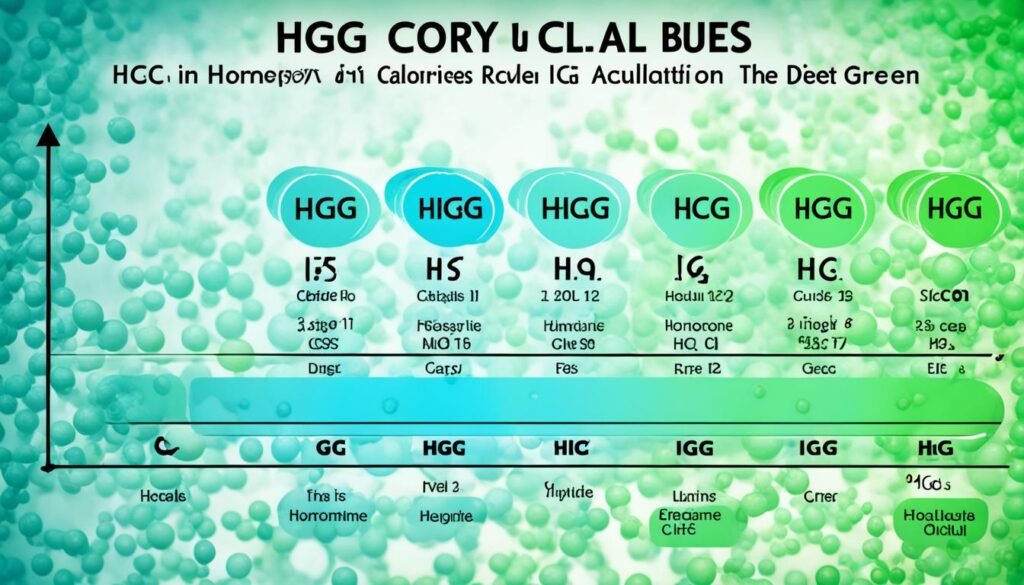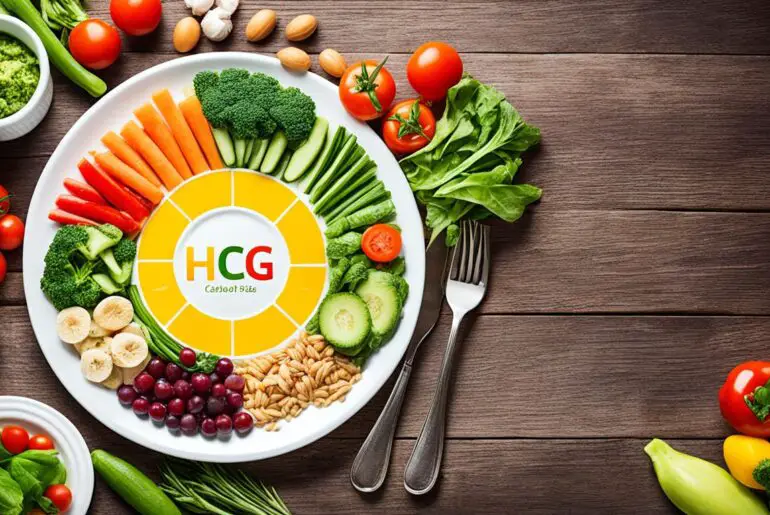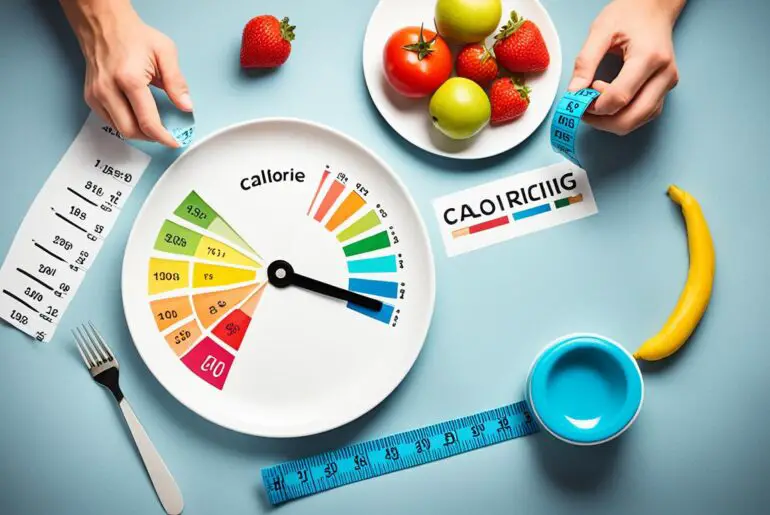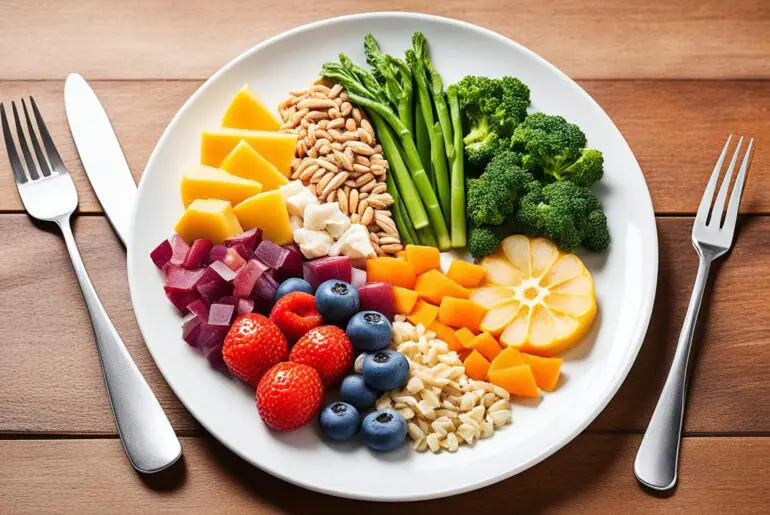Are you considering the HCG diet for weight loss? Many people turn to this popular plan to shed pounds and achieve their desired body goals. But have you ever wondered how to maintain your weight after completing the HCG diet?
The HCG diet involves calorie restriction and regular doses of Human Chorionic Gonadotropin (HCG) injections. These injections stimulate the release of stored fat in the body, which leads to rapid weight loss. However, maintaining that weight loss can be a challenge for many individuals.
In this article, we will explore the key factors to consider for successful weight maintenance after the HCG diet. From calorie calculations to exercise routines, we’ll provide you with the essential information you need to keep those HCG diet results for the long term.
Key Takeaways:
- Gradually increase calorie intake to avoid weight gain post-HCG diet
- Reintroduce normal foods slowly and in moderation
- Establish an exercise routine for weight maintenance
- Choose a reputable clinic for a safe HCG diet experience
- Consider safer and sustainable alternatives for weight loss
What Is the Problem with HCG Dieters?
When it comes to the HCG diet, dieters often face a common problem – weight gain after completing the program. To understand why this occurs, we need to delve into the intricacies of the diet and its effects on the body.
The HCG diet involves the use of HCG injections, which stimulate the hypothalamus gland to release stored fat, leading to weight loss. However, during the diet phase, dieters are required to restrict their calorie intake to a mere 500-800 calories per day. This severe calorie restriction puts the body into a state of starvation mode.
Starvation mode is the body’s natural response to a drastic reduction in calorie intake. In this state, the body perceives a threat of potential famine and adjusts its metabolism to conserve energy. As a result, the body becomes highly efficient in utilizing and storing calories. When dieters eventually resume their regular calorie intake after completing the HCG diet, the body holds on to calories in preparation for another period of potential food scarcity.
This is where the problem arises – weight gain after the HCG diet. The body, still in survival mode, retains more calories than necessary, leading to weight gain instead of weight maintenance. This phenomenon can be frustrating for dieters who have worked hard to achieve their weight loss goals.
To combat this issue and maintain weight after completing the HCG diet, dietary and lifestyle adjustments are crucial. Gradually increasing calorie intake, reintroducing normal foods in moderation, and establishing an exercise routine are important steps to transition out of starvation mode and maintain a healthy weight.
“The strict calorie restriction of the HCG diet can put the body into starvation mode, leading to weight gain after the diet phase.” – Dr. Samantha Thompson, Dietitian
By understanding the challenges faced by HCG dieters and implementing appropriate strategies, it is possible to maintain weight loss and achieve long-term success after completing the HCG diet phase.
Key Factors Contributing to Weight Gain After HCG Diet
| Factor | Description |
|---|---|
| Calorie Restriction | Strict calorie intake of 500-800 calories per day during the diet phase. |
| Starvation Mode | The body’s response to conserve energy and hold on to calories. |
| Mindset and Habits | Limited variety of foods and potential resumption of unhealthy eating habits after the diet phase. |
| Metabolic Adaptation | The body’s adjustment to the reduced calorie intake, resulting in a slower metabolism. |
Maintaining Weight After HCG Diet

To maintain weight after completing the HCG diet, it is essential to focus on gradual adjustments to calorie intake and lifestyle habits. By implementing these strategies, you can avoid potential weight gain and sustain your weight loss success in the long term.
Gradually Increase Calorie Intake
One of the key steps in maintaining weight after the HCG diet is gradually increasing your calorie intake. Instead of abruptly returning to your normal diet routine, start by adding an extra 200 calories per day. Over time, gradually work your way up to the recommended general intake of 1500 calories per day, allowing your body to adjust to the change without confusion.
Calculating a benchmark for calorie intake can be beneficial when determining how much to increase your daily intake. To find this benchmark, multiply your current weight by 13. This figure provides a safe and practical starting point for gradually increasing calorie consumption while avoiding weight gain.
Reintroduce Normal Foods Slowly
As you transition from the HCG diet to a more conventional eating pattern, it’s important to reintroduce normal foods slowly and in moderation. This approach allows your body to adapt to a wider variety of foods and prevents any potential digestive issues. Consider incorporating different food groups gradually while monitoring how your body responds.
Monitor Weight and Make Adjustments
Throughout the process of maintaining weight after the HCG diet, it is crucial to monitor your weight regularly. By keeping track of your progress, you can identify any fluctuations or unexpected changes and make timely adjustments to your calorie intake or exercise routine if necessary. Being proactive in monitoring your weight helps ensure long-term weight maintenance and overall success in your weight loss journey.
To maintain weight after completing the HCG diet, a gradual increase in calorie intake, a slow reintroduction of normal foods, and consistent monitoring of weight are key. By implementing these strategies and making sustainable lifestyle adjustments, you can effectively maintain your weight loss and achieve long-term results.
Exercise Routine for Weight Maintenance
During the HCG diet phase, strenuous exercise is not recommended due to the reduced calorie intake. However, once the diet phase is over and calorie intake is increased, regular exercise becomes essential for weight maintenance. Engaging in at least 75 minutes of vigorous exercise or 150 minutes of moderate exercise per week can help burn calories and prevent weight regain.
Activities like cardio and resistance exercises are recommended for their calorie-burning benefits. Cardio exercises such as running, cycling, or swimming can elevate your heart rate and help you burn calories effectively. Additionally, resistance exercises like weightlifting or bodyweight exercises can help build lean muscle mass, which can further enhance calorie burn even at rest.
Remember, there isn’t a one-size-fits-all exercise routine for weight maintenance. It’s important to choose activities that you enjoy and that fit into your lifestyle. This will increase the likelihood of sticking to your exercise routine in the long term.
Regular exercise is crucial not only for burning calories but also for maintaining overall health and well-being. It helps strengthen your cardiovascular system, improve mood, and increase energy levels. Making exercise a part of your daily routine can have numerous benefits beyond weight maintenance.
So, whether it’s jogging in the park, taking a dance class, or playing a sport, find an exercise routine that works for you and helps you maintain your weight loss after the HCG diet.
Expert Tip:
“To maximize calorie burn, consider incorporating high-intensity interval training (HIIT) into your exercise routine. HIIT involves short bursts of intense exercise followed by brief recovery periods. This type of workout helps boost your metabolism and torch calories even after you’ve finished exercising.”
Importance of Choosing the Right Clinic
When it comes to embarking on the HCG diet journey, selecting a reputable and authorized clinic is of utmost importance. Not all clinics offering HCG diet services are created equal. To ensure a safe and effective experience, it is crucial to choose an authorized clinic that offers a medically supervised HCG program.
In today’s digital age, searching for “HCG diet near me” online can provide a list of clinics conveniently located in your area. However, it is not enough to rely solely on proximity. Take the time to research each clinic and verify their authorization to carry out the HCG procedure. This step will help you distinguish between legitimate providers and those that may not meet the necessary standards.
A medically supervised HCG program is essential for your well-being and success on the diet. Under the guidance of trained professionals, you can ensure that the HCG injections are administered correctly and in the appropriate dosage. The supervision of medical experts offers a crucial safeguard against any potential harmful side effects that could arise from improper administration.
Choosing a reputable and authorized clinic ensures that you receive the necessary support and guidance throughout your HCG diet journey. The experts at these clinics can answer any questions or concerns you may have, provide personalized advice, and monitor your progress to ensure optimal results.
By selecting an authorized clinic with a medically supervised HCG program, you are taking a significant step towards a successful and safe weight loss journey. Remember, your health and well-being should always be the top priority when embarking on any diet or weight loss program.
The Science Behind the HCG Diet

The hCG diet is centered around the use of the hCG hormone, which is naturally produced in high levels during early pregnancy. This hormone has gained attention for its potential role in weight loss. The hCG diet protocol involves combining hCG hormone injections with a very low-calorie intake, typically around 500 calories per day, in an effort to achieve significant weight loss.
However, scientific studies have revealed that the weight loss experienced on the hCG diet is primarily attributed to the extreme calorie restriction rather than the hCG hormone itself. The severe restriction of calories forces the body to utilize stored fat as an energy source, leading to weight loss.
It is important to note that the hCG diet approach can have negative consequences. The significant calorie deficit can result in muscle loss, which is undesirable for both aesthetic and metabolic reasons. Additionally, the prolonged calorie restriction can cause a slowdown in the body’s metabolic rate. This metabolic slowdown can make it difficult to sustain weight loss in the long term and may contribute to weight regain once regular calorie intake is resumed.
The key takeaways are:
- The weight loss achieved on the hCG diet is primarily due to extreme calorie restriction.
- Calorie restriction forces the body to utilize stored fat as an energy source, leading to weight loss.
- The hCG hormone itself does not directly cause weight loss.
- The hCG diet can result in muscle loss and a slowed metabolic rate, making weight maintenance challenging.
It is important to approach weight loss in a manner that prioritizes overall health and sustainability. Consulting with a healthcare professional or registered dietitian can provide guidance on safe and effective weight loss strategies that suit individual needs and goals.
| Pros | Cons |
|---|---|
| * Initial weight loss due to calorie restriction | * Potential muscle loss |
| * Structured diet plan | * Slowed metabolic rate |
| * Motivation from quick results | * Difficulty maintaining weight loss long-term |
| * Potential side effects from hCG injections |
Scam Products and Safety Concerns
When it comes to hCG products, it’s important to be wary of scams and prioritize safety. Many products on the market claim to be homeopathic hCG, but in reality, they do not contain real hCG. The FDA has classified these products as unsafe and warns against their use for weight loss.
The hCG hormone should only be administered as a prescription medication and under medical supervision. It is not safe to rely on over-the-counter or unregulated hCG products for weight loss.
It’s also essential to be aware of the potential side effects associated with the hCG diet. While some individuals may experience successful weight loss, others may encounter headaches, fatigue, depression, and an increased risk of blood clots.
Ensuring safety should be a top priority when considering any weight loss program. Consulting with a healthcare professional or a licensed medical practitioner before starting the hCG diet or any other weight loss program is crucial. They can provide personalized guidance based on your specific health needs and help you make informed decisions.
Quote:
“It’s crucial to prioritize safety and consult with a healthcare professional before starting any weight loss program.”
Safer Alternatives for Weight Loss

If weight loss is your goal, there are healthier and more sustainable methods than the hCG diet. Achieving permanent weight loss requires a combination of a balanced diet and regular exercise. By prioritizing your overall health and well-being, you can make lasting changes and achieve your weight loss goals.
Consulting with a doctor, dietitian, or nutritionist can provide valuable guidance on creating a personalized plan that is tailored to your specific needs and preferences. They can help you determine the right balance of nutrients and calories to support your weight loss journey.
Instead of extreme calorie restriction, it is recommended to focus on small, gradual calorie deficits. This approach helps prevent metabolic slowdown and ensures sustainable weight loss over time. By making gradual changes to your eating habits, you can create a balanced and enjoyable diet that supports your weight loss goals.
Regular exercise is another crucial component of a healthy weight loss plan. Engaging in physical activity not only helps burn calories but also improves overall fitness and well-being. Aim for at least 150 minutes of moderate exercise or 75 minutes of vigorous exercise per week. Choose activities that you enjoy and that fit into your lifestyle, whether it’s going for a brisk walk, attending fitness classes, or participating in team sports.
To summarize, when it comes to weight loss, focus on healthier methods such as adopting a balanced diet, engaging in regular exercise, and making sustainable changes for permanent results. By prioritizing your overall health and well-being, you can achieve your weight loss goals and maintain a healthy lifestyle for the long term.
| Healthier Weight Loss Methods | Advantages |
|---|---|
| Adopting a balanced diet | – Provides essential nutrients for overall health – Supports sustainable weight loss – Promotes long-term dietary habits |
| Engaging in regular exercise | – Burns calories and promotes weight loss – Improves overall fitness and well-being – Helps maintain muscle mass |
| Making gradual changes | – Prevents metabolic slowdown – Allows for sustainable weight loss – Encourages long-term lifestyle changes |
Conclusion
Successful weight maintenance after the HCG diet requires a comprehensive approach. It is important to recognize that the HCG diet is not a long-term solution and that maintaining weight requires ongoing commitment to a healthy lifestyle.
One key factor in successful weight maintenance is gradually increasing calorie intake. This allows the body to adjust to a higher calorie level without triggering weight gain. Additionally, reintroducing normal foods slowly and in moderation helps the body adapt and prevents excessive calorie intake.
Establishing an exercise routine is another crucial aspect of weight maintenance. Regular physical activity not only burns calories but also helps improve overall health and prevent weight regain. Engaging in activities such as cardio and resistance training for at least 150 minutes per week can contribute to long-term weight maintenance.
Lastly, choosing a reputable clinic for the HCG diet is essential. Authorized clinics provide the necessary support and guidance throughout the diet journey, ensuring safety and success. By focusing on sustainable habits, making gradual changes, and maintaining a healthy lifestyle, individuals can achieve long-term weight loss and maintain their success beyond the HCG diet phase.
FAQ
What is the HCG diet?
The HCG diet is a weight loss plan that involves calorie restriction and regular doses of Human Chorionic Gonadotropin (HCG) injections. The injections stimulate the release of stored fat in the body, leading to weight loss.
Why do many people struggle to maintain their weight after completing the HCG diet?
The body goes into starvation mode during the HCG diet and fights to hold on to calories. This can result in weight gain once regular calorie intake is resumed.
How can I maintain weight after the HCG diet?
To maintain weight after the HCG diet, it is important to gradually increase calorie intake, reintroduce normal foods, and establish an exercise routine.
How should I gradually increase calorie intake after the HCG diet?
Start with a small increase of 200 kcal per day and gradually work up to the general optimum intake of 1500 kcal. The optimum number of calories that can be safely consumed without risking weight gain can be calculated by multiplying your weight by 13.
Is exercise important for weight maintenance after the HCG diet?
Yes, regular exercise is crucial for preventing weight gain after the HCG diet. Engaging in at least 75 minutes of vigorous exercise or 150 minutes of moderate exercise per week can help burn calories and prevent weight regain.
You can search online for “HCG diet near me” to find a list of clinics offering the service. However, it is important to ensure that the chosen clinic offers a medically supervised HCG program to avoid any potential harmful side effects.
Does the HCG hormone play a significant role in weight loss on the HCG diet?
Scientific studies have shown that the weight loss achieved on the HCG diet is primarily due to extreme calorie restriction rather than the HCG hormone itself. The HCG hormone injections stimulate the hypothalamus gland to release stored fat, but the calorie restriction is the main driver of weight loss.
Are there any safety concerns with HCG products?
Many HCG products labeled as homeopathic do not contain real HCG and have been deemed unsafe by the FDA. The HCG hormone is available as a prescription medication and should only be administered under medical supervision.
What are safer alternatives for weight loss?
A balanced diet that includes all essential nutrients and regular exercise are key components of healthy weight loss. Consulting with a healthcare professional can help create a personalized plan that focuses on long-term success.
How can I achieve long-term weight maintenance after the HCG diet?
Successful weight maintenance requires a comprehensive approach. Gradually increasing calorie intake, reintroducing normal foods, establishing an exercise routine, and choosing a reputable clinic are key factors to consider. Prioritizing a healthy lifestyle beyond the HCG diet phase is essential for long-term success.




